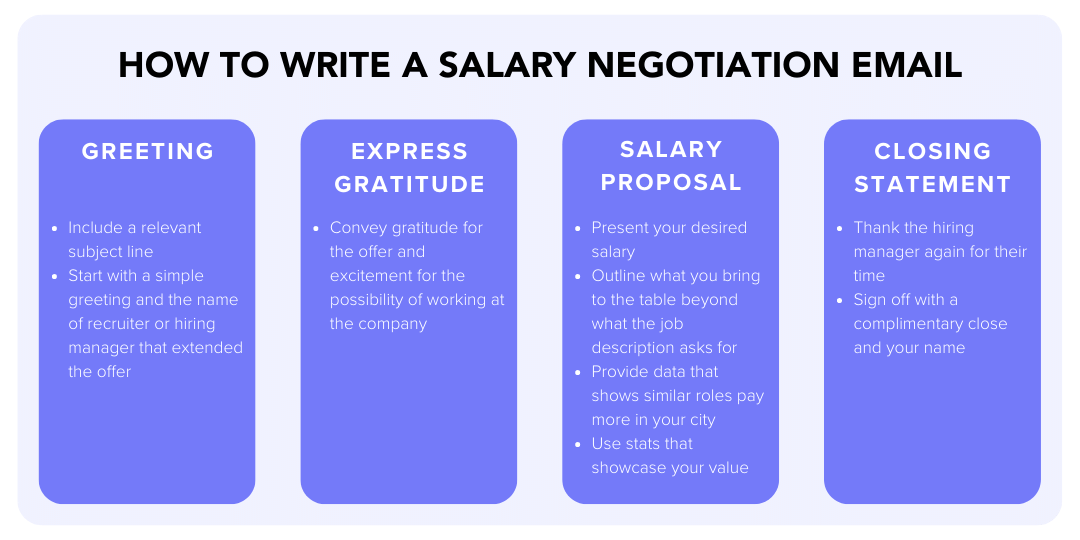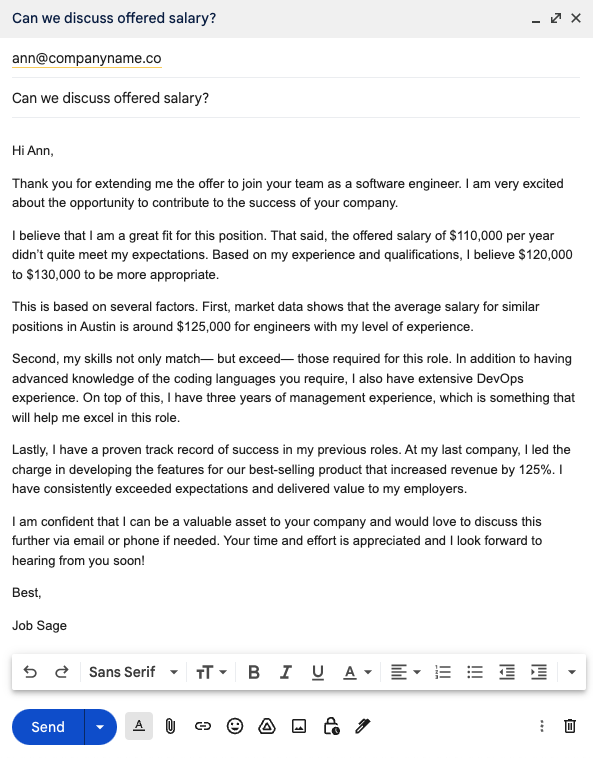Getting a job offer with a salary lower than you were hoping for can create a mixed bag of emotions. On one hand, you have the opportunity to work for a company that you may really like. On the other, you feel that you won’t be adequately compensated for all that you bring to the table.
Luckily, you don’t have to settle.
Before you accept the offer, you can negotiate the salary. And you can do so over email— yes, email!
In this article, we’ll break down:
- When to send a salary negotiation
- What to include in a salary negotiation email
- An example salary negotiation email
- What to do if you still don’t get the salary you want
When to send a salary negotiation
Salary negotiation should take place after you’ve received an offer. You don’t want to start negotiating before you know what they’re going to offer you!
After you’ve received an offer, act promptly and begin crafting your negotiation. Waiting too long to respond may tell the recruiting team that you’re not interested in the role. Be mindful of any deadlines they give you and be sure to start your negotiation before then.
If you find yourself hesitant to request more money, act confidently knowing that 84% of employers say they always expect job applicants to negotiate salary. When done respectfully, negotiating salary is typically not something that an employer will rescind your offer over. You won’t be the first person to ask for more money, and you likely won’t be the last.

What to include in a salary negotiation email
There are four main components to your salary negotiation email.
1. Start with a greeting
Include the name of the hiring manager or recruiter that you are replying to.
2. Express gratitude
Let your prospective employer know that you are excited about the role and appreciative of the offer.
3. Present your desired salary with reasoning
Acknowledge the amount that they offered you, but politely explain that your expectations are a little higher. Give the range that you were hoping to receive, along with your reasoning. This can include:
- Market research: Are other companies paying significantly more for similar roles? Backup your request with data on average salaries for equivalent positions for other employers in your city.
- Experience that goes beyond the job description: Do you have skills that go above and beyond what is required on the job listing? List those out here. Remember, include skills that you could use on the job. An employer hiring for a marketing role may be excited to hear that you have graphic design experience but probably wouldn’t care that you are also an experienced horseback rider.
- What your skills can do for the company: Do you have data to back up your claims of experience? Perhaps at your previous job, you helped grow your social following to over ten thousand followers and saw record breaking revenue. As an engineer, you may have pioneered a process that improved your company’s efficiency by 50%.
This is your opportunity to convince the employer that you are worth the addition money you’re asking for.

Show what you’ll do for the company
Instead of just citing what you have done for other companies, demonstrate what you can do for them.
Consider creating an action plan for your first 90 days. This shows initiative, an understanding for their business and the role, and starts to illustrate what they would miss out on by NOT hiring you. This makes it harder for them to walk away!
— Nora Tucker, Product Coach and Founder of The Ithaka Group
4. Finish with final remarks
Lastly, thank the recruiter again for their time and express your willingness to negotiate. Sign off with a complimentary close and your name.
What to avoid in a salary negotiation
There are a few things you’ll want to steer clear of when crafting your negotiation.
- Negative tone: Even if the offered salary is far below what you had in mind, do not take it as a personal insult. Always remain upbeat, positive, and respectful in your communication.
- Talking poorly about your previous employer: Avoid any negative comments about your current or previous employer, as it can reflect poorly on your character.
- Details about your personal life: There’s no need to go into detail about why a higher salary would be beneficial to you. The hiring manager won’t be swayed by the fact you have a big car payment and your rent just went up.
Additionally, you’ll want to avoid mentioning your current salary. This isn’t information that they need to know, and it is actually illegal for interviewers to ask in some cities and states!
Salary negotiation email example
Putting the above into practice, let’s look at what your negotiation email may look like.

Hello [Recruiter Name],
Thank you for extending me the offer to join your team as a software engineer. I am very excited about the opportunity to contribute to the success of [Company].
I believe that I am a great fit for this position. That said, the offered salary of $110,000 per year didn’t quite meet my expectations. Based on my experience and qualifications, I believe $120,000 to $130,000 to be more appropriate.
This is based on several factors. First, market data shows that the average salary for similar positions in Austin is around $125,000 for engineers with my level of experience.
Second, my skills not only match— but exceed— those required for this role. In addition to having advanced knowledge of the coding languages you require, I also have extensive DevOps experience. On top of this, I have three years of management experience, which is something that will help me excel in this role.
Lastly, I have a proven track record of success in my previous roles. At my last company, I led the charge in developing the features for our best-selling product that increased revenue by 125%. I have consistently exceeded expectations and delivered value to my employers.
I am confident that I can be a valuable asset to your company and would love to discuss this further via email or phone if needed. Your time and effort is appreciated and I look forward to hearing from you soon!
Best,
Job Sage
What to do if you still don’t get the salary offer you wanted
It’s possible that the company will stand firm with the amount that they budgeted for. That leaves you with three options:
- Decline the job offer and continue your job search.
- Accept the job offer with their offered salary and hope for a raise in the future.
- Negotiate further with non-monetary benefits, such as reduced work hours, more vacation days, better job title, company equity, etc.
If you are hard set on earning a certain salary, explore companies who are transparent about their salaries in the job description. By doing this, you know a company will meet your expectations from the get-go.

Consider a sign-on bonus
Don’t forget about the possibility of a sign-on bonus when negotiating your salary!
Signing bonuses are typically easier to negotiate than a salary increase and can help you get the monetary compensation you are looking for in the first year. After that, you have time in the role to prove your value and try to get a raise to bring you to your desired level.
The bottom line
Not getting the salary offer you were expecting can be disappointing. The good news is that there is still a chance to get the pay you want. With the right salary negotiation email, you can show an employer what all you bring to the table and why you are worth the extra money.
More content you may find helpful:
